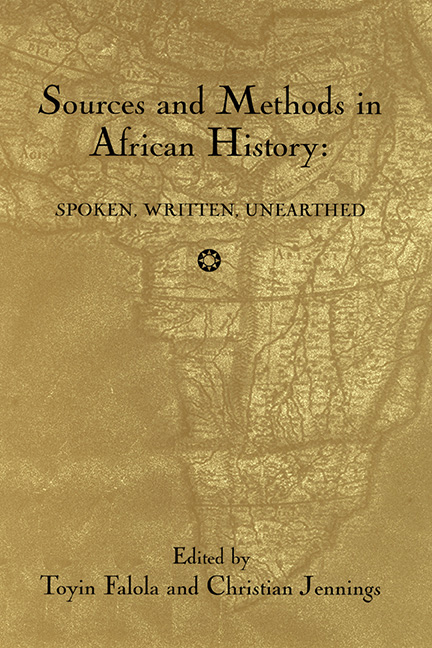Book contents
- Frontmatter
- Dedication
- Contents
- Acknowledgments
- Introduction
- Part I Archaeological Sources
- Part II Africa and the Atlantic World
- Part III Documentary Sources
- Part IV Oral Tradition
- Part V Innovative Sources and Methods
- 19 Section Introduction: Innovative Sources and Methods
- 20 Ben and Maggie: Consuming Data: Reassessing Scientific and Anthropological Evidence: Historical Perspective on Nutrition Studies
- 21 Electricity Networks in Africa: A Comparative Study, or How to Write Social History from Economic Sources
- 22 “Rain or Shine We Gonna' Rock”: Dance Subcultures and Identity Construction in Accra, Ghana
- 23 Sample Surveys: Underexploited Sources for African Social History
- Contributors
- Index
20 - Ben and Maggie: Consuming Data: Reassessing Scientific and Anthropological Evidence: Historical Perspective on Nutrition Studies
from Part V - Innovative Sources and Methods
Published online by Cambridge University Press: 25 October 2017
- Frontmatter
- Dedication
- Contents
- Acknowledgments
- Introduction
- Part I Archaeological Sources
- Part II Africa and the Atlantic World
- Part III Documentary Sources
- Part IV Oral Tradition
- Part V Innovative Sources and Methods
- 19 Section Introduction: Innovative Sources and Methods
- 20 Ben and Maggie: Consuming Data: Reassessing Scientific and Anthropological Evidence: Historical Perspective on Nutrition Studies
- 21 Electricity Networks in Africa: A Comparative Study, or How to Write Social History from Economic Sources
- 22 “Rain or Shine We Gonna' Rock”: Dance Subcultures and Identity Construction in Accra, Ghana
- 23 Sample Surveys: Underexploited Sources for African Social History
- Contributors
- Index
Summary
The title of this chapter means no disrespect in its familiarity. Its intention is to humanize and personalize the historical actors and to point out both the control they had over the information they gathered and its interpretation and availability. The Ben and Maggie of the title refers to Benjamin Platt, the medical researcher who was director of the 1939 Nyasaland Nutrition Survey and who collected all the data from the various scientists on the team, and to Margaret Read, the anthropologist for the survey. Never were they Ben and Maggie; their relationship was extremely formal and filled with friction. In fact, they had a falling out early in the undertaking that resulted in Read working separately and providing her own report which was appended to Platt's main report. Because of this separation of the data, it is possible and useful to distill the two distinctive interpretations. In addition to their being the main collectors of the data that focused on how people in three Nyasaland villages fed themselves, for various reasons, these data, with two exceptions, remained in their personal possession and was neither published nor distributed and thus, never really interpreted. This chapter is an effort to provide a dialogue between Ben and Maggie.
The arguments of this chapter are twofold. The major one concerns the value of comparing Read's anthropological data with the scientific measurements made by the team and then her further comparisons that emerge from her own reanalysis in a period up to the 1970s, when she produced a draft manuscript of a more extensive examination of the situations in the three villages. The other argument is an underlying one—the issue of the data itself, and our presumption that all colonial data is in colonial archives and that projects undertaken exist at least in some sort of report.
I raise these concerns against the prevailing presumption that colonial documents of Africa are tainted by the ignorance, arrogance, and racism of their producers. I argue that when we seek to learn of the nature, form, and content of the European colonial project in Africa and the nature of the life of colonial subjects, these reports can be used to illuminate aspects of the social history of the colonized.
- Type
- Chapter
- Information
- Sources and Methods in African HistorySpoken Written Unearthed, pp. 335 - 345Publisher: Boydell & BrewerPrint publication year: 2003

